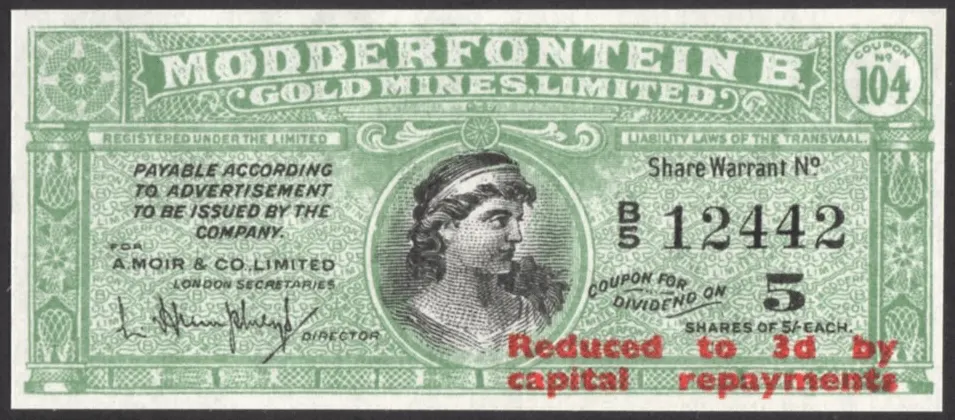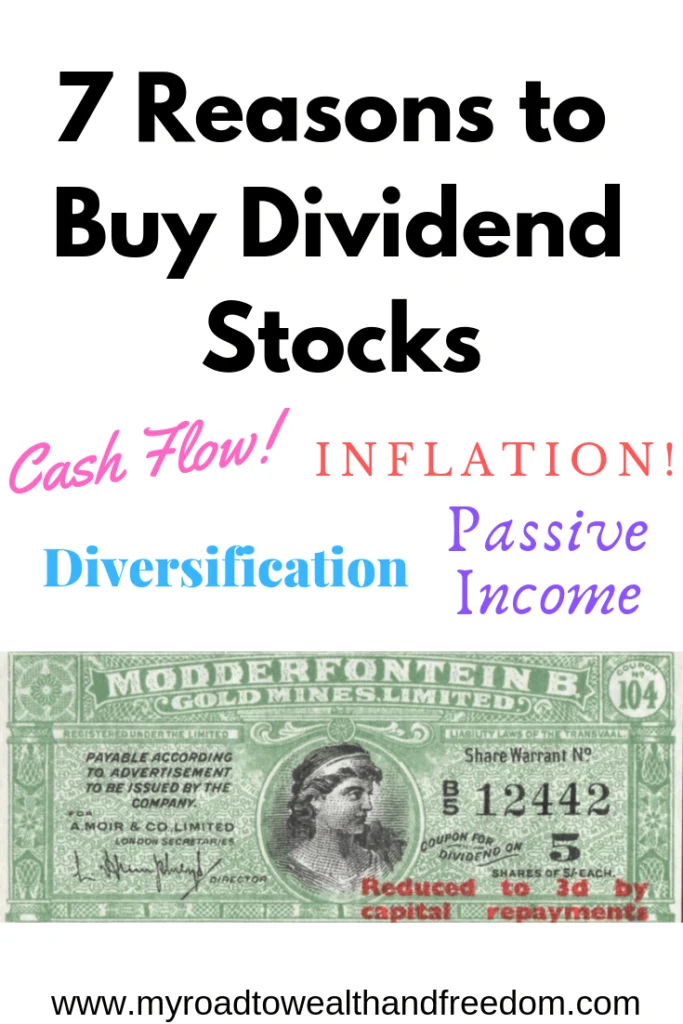This article on 7 reasons to buy dividend stocks will explain why dividend investing is such a compelling investment strategy.
What is it about dividend stocks that make them such a compelling investment strategy? It seems that everywhere you look nowadays some financial commentator is urging people to load up on dividend stocks. I’ve been investing in these stocks for over 10 years now and have found them to be a winning investment strategy.
There really is no secret to this strategy. All you need is an online brokerage account, like Questrade, and the willingness to do a small amount of research. The payoff for doing so could be enormous. In this post I’ll give you 7 reasons why everyone should buy and hold dividend-paying stocks. But first some basics like what is a dividend anyways?
What is a Dividend?

Source: Public Domain via Wikimedia Commons
If you’re new to investing you may be wondering just what exactly is a dividend? A dividend is simply part of a company’s earnings that is paid out, usually on a quarterly basis, to its shareholders.
Why Do Companies Pay a Dividend?
If a company pays all of its operating expenses and still has money left over, it has two options open to it. It can either reinvest that money back into the business to keep growing its earnings or it can pay some of the money out to its shareholders. Small companies that are rapidly growing usually choose the first option. The companies that choose to pay a dividend are typically mature and stable businesses that have a slower growth profile.
For example, think of Microsoft (MSFT) and Apple (APPL). Both companies went through a period of phenomenal growth where they kept reinvesting their earnings to build out their businesses to sustain their high growth rates.
Now that both companies have a dominant position in their industries it’s no coincidence that they have instituted a dividend policy in the last few years. While they’re both still quite profitable, they also have fewer growth opportunities available to them than they once had and, therefore, less of a need to retain all of their earnings.
7 Reasons to Buy Dividend Stocks

Now that we know what a dividend is and why companies pay them, here are 7 reasons why everyone should own dividend stocks.
1. Dividend Stocks Provide Stability to an Investment Portfolio
Most people think of the stock market as a “buy low, sell high” kind of game where the investor is constantly trying to “win” at successfully timing the market. In reality that approach to investing is likely to end very badly and cost you dearly.
On the other hand, the approach of the dividend investor is the exact opposite. When it comes to dividend stocks, ideally the game is to buy and hold…forever. That’s because a growing number of studies have found that around 50% of market returns over the last 100 years have come from dividends and that it’s “time in” rather than “timing” the market that makes all the difference with investment returns.
Dividends provide much needed stability and income to an investment portfolio, especially during stock market crashes. During the 2008-09 market collapse my stocks were down about 50%. Those were definitely scary times but what helped a lot of investors get through it all was the fact that their dividend income kept rolling in quarter after quarter. This is another great benefit of dividend stocks. They usually keep paying us in good times and in bad.
2. Dividend Stocks Provide Passive Income
Dividends are a great source of passive income – that is income that you don’t have to work for. If you buy a collection of quality dividend-paying stocks then you’re making your money work for you. By reinvesting your dividend income you can grow both, your assets and your income exponentially over time. The more passive income that you have coming in, the less you’ll actually have to work for money.
It’s for that reason that I’ve found investing in dividend-paying stocks to be an effective long term strategy. If someone was to buy and hold a basket of quality dividend stocks and reinvest the dividend income, with the help of compounding, that person may be able to retire and live off of the dividend income alone; without ever having to sell the underlying assets that produce that income. That’s why dividend growth investing is such a powerful investment strategy.
Some of the richest investors in history have used this approach such as Warren Buffett and John D. Rockefeller. Mr. Rockefeller once said: “Do you know the only thing that gives me pleasure? It’s to see my dividends coming in.” Now that’s pretty hard core!

Source: Public Domain via Wikimedia Commons
3. Dividends Diversify a Person’s Income
Dividends are an easy way to diversify your income. Most people rely exclusively on 1 income source: their job. If you start building an investment portfolio of quality dividend-paying companies then you are essentially building a second income stream that will continue to grow over time. This kind of income diversification can serve as a safety net to cushion the blow of a sudden job loss or unexpected increases in someone’s cost of living.
Dividends from quality blue chip companies are typically a stable source of income that can, over one’s working life, supplement employment income and eventually become a primary source of income in its own right. I should mention here that dividends are by no means guaranteed. After all, there is no such thing as certainty in life. That said, some Canadian banks, for example, have paid dividends consistently for nearly 200 years – through two world wars, a Great Depression, a Cold War and the Global Financial Crisis. In my opinion that’s as close to a sure thing as one can get.
4. Dividends Increase Over Time
One of the reasons that dividend-paying stocks are so appealing has to do with the fact that the dividend payout usually increases each year. That means you’ll get paid more money each and every year! Companies that regularly increase their dividend are known as dividend aristocrats.
A dividend aristocrat is a company that not only pays a regular dividend, but also one that increases it on a regular basis (at least annually). For example, to make the S&P 500’s dividend aristocrat list, a company must have increased its dividend annually for at least 25 consecutive years.
Many of the companies on this list are recognizable household names: Procter & Gamble (PG), Coca-Cola (KO), Exxon Mobil (XOM), Colgate-Palmolive (CL), Johnson & Johnson (JNJ), Kimberly Clark etc. They make products that millions of people use on a daily basis. Some Canadian examples of dividend aristocrats include: Canadian Utilities (CU), Fortis (FTS), Enbridge (ENB), TD Bank (TD), Telus (T) and Bank of Nova Scotia (BNS).
My own experience with dividend stocks has been that in the last few years my companies have increased their dividends on average between 5% and 7%. That’s at least double the current inflation rate of 2%-2.5% which is another big reason why dividend stocks are so popular.
5. Dividend Stocks are an Inflation Hedge
Dividend stocks are a great investment because they tend to keep up with or even beat inflation over time. If you have a long term financial goal and don’t properly invest your money in growth assets, such as dividend stocks, then you will see your purchasing power gradually erode due to inflation. Dividend stocks are a great way to keep ahead of inflation, especially the aristocrats that regularly increase their payouts.
6. Dividends are Tax Efficient Income
In most tax jurisdictions, dividend income is taxed far more favourably than regular employment income (ie. money that you work for). Dividends are paid by companies net of all taxes. So it makes sense that the tax burden should be less for someone receiving dividend income because the taxes have already been paid by the company.
Individuals who receive dividend income will have to pay some amount of personal income tax on it. In most tax jurisdictions dividend income is taxed somewhere around 30%. Still, there’s no disputing the fact that dividends are tax efficient income. In Canada, for example, if dividend income were a person’s only source of income, they could earn nearly 50k/year in dividends without having to pay any taxes on it.
7. Dividend Income Increases Your Cash Flow
I’m a firm believer that the No. 1 problem most people have is that they don’t have enough money. Investing in dividend-paying companies will undoubtedly increase our cash flow because we’re buying an income producing asset.
As a rule, I always reinvest my dividends to grow both, my assets and my income. However, if I ever lost my job or had some unexpected expenses I could always take the cash payments instead of reinvesting them. So dividend stocks add some flexibility to a person’s finances that few other investment options can offer.
Where to Find the Best Dividend Stocks to Buy
Now that we’ve reviewed the reasons to buy dividend stocks, here’s how to find good dividend stocks. First let me just say that there is nothing special about the stocks that I buy. In fact, they are actually quite boring. I say “boring” because these companies tend to be the under the radar / business as usual types. In the investing world, “boring” is good because it usually means that a company’s earnings and growth profile are stable and consistent and that is exactly what you’re looking for as a long term investor.
Where can someone find companies that fit this profile? They can be found in the banking, utility, pipeline, telecom and consumer staple sectors. These businesses have seen it all and have survived for decades and that means that they’ll most likely be around for many more decades to come.
If you take a look at the top 10 holdings of a dividend mutual fund or an exchange-traded fund, you’ll undoubtedly find that many of these funds own the same set of companies. That’s no coincidence. Chances are the companies in the top 10 holdings of these funds have been great long term investments. Alternatively, you can search out the Dividend Aristocrats lists that are published each year.
A few notes of caution are in order however. First, beware of high yield stocks. A high yield could be an indication that a company is in some sort of financial trouble and could cut the dividend altogether.
Second, watch the payout ratio on dividend stocks. In general, you want your dividend stock to have a payout ratio between 50%-60%. That gives the company room to grow its dividend as it grows its earnings. A high payout ratio could mean that there is very little room for the dividend to grow over time. That said, the utility and telecom sectors may have higher payout ratios due to the nature of their businesses.
As with all investing, it is important to do your own research and consult with a financial advisor.
Thanks for reading 7 reasons to buy dividend stocks.